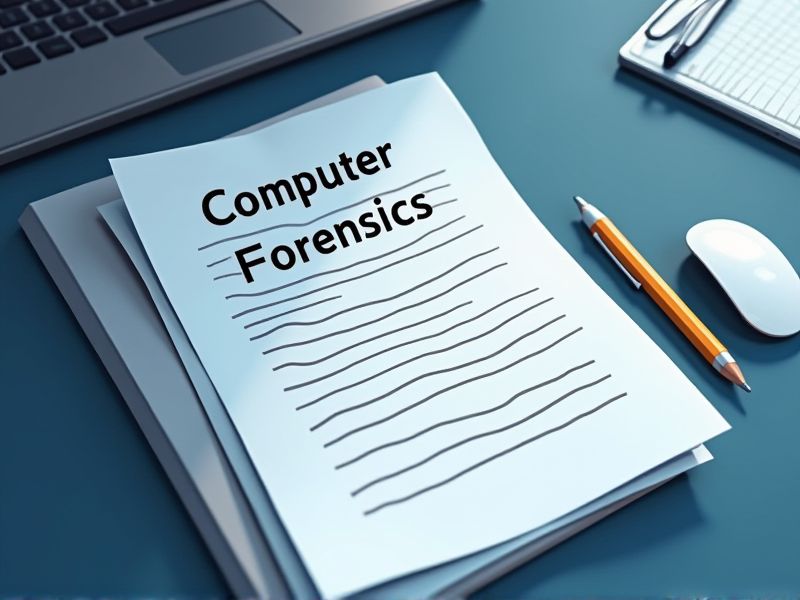
Computer Forensics Analysts face increasingly sophisticated cyber threats, necessitating advanced knowledge and specialized skills. Certifications validate an analyst's proficiency in handling diverse forensics tasks, significantly enhancing their credibility. Certain certifications provide evidence of expertise in crucial areas like data recovery and malware analysis. Key certifications essential for a Computer Forensics Analyst include the following.
EC-Council Computer Hacking Forensic Investigator (CHFI)
The CHFI certification provides essential skills for identifying and extracting digital evidence, crucial for Computer Forensics Analysts tasked with investigating cybercrimes. Expertise gained through the CHFI enhances an analyst's capability to handle incidents involving data breaches and cyber threats. Proper certification ensures adherence to legal protocols during digital investigations, reducing the risk of data mishandling. Effective analysis and recovery of digital evidence through CHFI knowledge increases the accuracy and efficiency of forensic investigations.
EnCase Certified Examiner (EnCE)
Obtaining the EnCase Certified Examiner (EnCE) credential helps a Computer Forensics Analyst validate their expertise in using the EnCase software, a widely recognized tool in digital investigations. Mastery of EnCase efficiently allows analysts to manage and analyze large amounts of digital evidence. The certification ensures adherence to industry standards, increasing the reliability of investigative findings. EnCE-certified professionals often have enhanced credibility and job prospects in fields requiring digital forensics expertise.
GIAC Certified Forensic Analyst (GCFA)
The complexity of modern cyber threats necessitates highly knowledgeable professionals, and the GIAC Certified Forensic Analyst (GCFA) certification provides the specialized skills needed to address these challenges. Employers value the GCFA as it validates an analyst's ability to effectively conduct in-depth forensic investigations and understand advanced data recovery methods. Investigations often require legal admissibility, and the GCFA ensures analysts are versed in proper evidence handling and reporting techniques. Sophisticated cyber incidents demand cutting-edge analytical expertise, which the GCFA helps develop through rigorous training in identifying, collecting, and analyzing digital evidence.
Certified Computer Examiner (CCE)
The Certified Computer Examiner (CCE) enhances credibility by demonstrating verified expertise in computer forensic methodologies. Possession of a CCE credential often increases trust from clients and in legal proceedings, given the rigor of the certification process. Organizations frequently require certified professionals to ensure adherence to industry standards and methodologies, reducing legal risks. Data integrity and case admissibility are better maintained when handled by someone with proven competency through certification like the CCE.
Certified Forensic Computer Examiner (CFCE)
The Certified Forensic Computer Examiner (CFCE) credential ensures that professionals have validated expertise in digital forensic methodologies, leading to more reliable and credible findings. This certification provides structured training, equipping analysts with the skills to competently handle digital evidence, which is crucial for legal proceedings. Holding the CFCE credential can enhance an analyst's career prospects in cybersecurity and law enforcement due to its recognition and reputation in the industry. Agencies and organizations benefit from hiring CFCE-certified professionals, as this assures compliance with industry standards and increases trust in digital investigations.
AccessData Certified Examiner (ACE)
Gaining the AccessData Certified Examiner (ACE) certification enhances a Computer Forensics Analyst's credibility by formally validating their technical skills in utilizing AccessData tools. This certification demonstrates an in-depth understanding of forensic software applications crucial for efficient data recovery and analysis. Employers often prefer or require ACE certification as it indicates a standardized level of expertise in handling digital evidence. The accreditation also aligns with industry standards, ensuring the analyst is equipped with the latest methodologies and practices essential in the evolving digital forensics field.
Certified Digital Forensics Examiner (CDFE)
The role of a Certified Digital Forensics Examiner (CDFE) enhances a Computer Forensics Analyst's capabilities by providing structured methodologies for digital evidence collection and preservation. CDFE certification equips analysts with advanced skills to navigate complex digital environments, ensuring data integrity and legal admissibility. With a CDFE, analysts gain proficiency in employing industry-standard tools, improving their efficiency in uncovering and understanding digital crimes. This certification also ensures adherence to best practices and up-to-date techniques in forensic analysis, which is crucial in evolving cybercrime landscapes.
GIAC Network Forensic Analyst (GNFA)
Organizations increasingly face sophisticated cyber threats, driving the demand for skilled professionals with GIAC Network Forensic Analyst (GNFA) credentials to effectively detect and respond to network-based attacks. The GNFA certification equips analysts with advanced skills in traffic analysis and network forensic investigations, crucial for identifying intrusion tactics and minimizing damage. In-depth understanding of network protocols becomes essential as evidence collection from digital environments is vital for building solid forensic cases. Enhancing a computer forensics analyst's capability, GNFA-certified individuals can bridge gaps between incident detection and comprehensive forensic analysis, ultimately strengthening cybersecurity resilience.
Certified Forensic Investigator (CFI)
The growing prevalence of digital crimes necessitates Certified Forensic Investigators (CFI) to accurately identify and preserve electronic evidence. A CFI ensures that all investigative processes adhere to legal standards, which is crucial for evidence to be admissible in court. Expertise from a CFI facilitates the thorough analysis of complex data structures and potential cybersecurity breaches. Increasing reliance on technology across industries demands professionals who can systematically uncover digital discrepancies and fraud.
SANS FOR508: Advanced Incident Response, Threat Hunting, and Digital Forensics
SANS FOR508 fills critical skill gaps for Computer Forensics Analysts by focusing on advanced incident response techniques. The course enhances the ability to effectively hunt for threats that bypass traditional security measures, increasing detection rates. By covering digital forensics, it enables analysts to thoroughly investigate compromised systems and gather actionable intelligence. This comprehensive training improves an analyst's competence in handling complex security incidents swiftly and accurately.
Summary
When you obtain certifications as a Computer Forensics Analyst, your credibility and career prospects can improve significantly. Certifications provide you with validated skills, increasing your chances of tackling complex cases effectively. Employers may prioritize candidates with recognized credentials, enhancing your employability and potentially leading to higher salary offers. Your ability to stay updated with industry standards also increases, fostering personal and professional growth.
